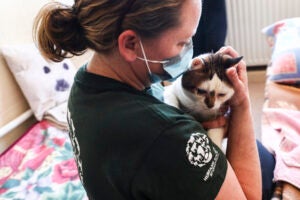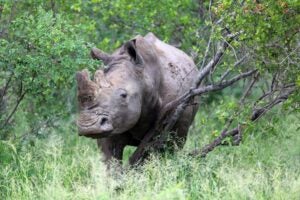
Update: This program has been extended to 31 December 2024.
BRUSSELS—Ukrainian refugees who have fled the war with their pets in tow will now be able to access free veterinary treatment in 38 European countries, thanks to an unprecedented program called Vets for Ukrainian Pets. Launched by animal charity Humane Society International and partners, Vets for Ukrainian Pets will cover the treatment costs of dogs, cats, horses or other pet animals, up to 250 Euros per animal, for acute care and medication, rabies and other vaccinations as well as microchipping and medical examination required for safe passage through the EU.
Vets for Ukrainian Pets is being fully funded by HSI, with the generous support of Mars, Incorporated, in collaboration with Federation of Veterinarians in Europe and the Federation of European Companion Animal Veterinary Associations. Reimbursements for participating veterinarians will be available wherever the FECAVA has members, including in the United Kingdom, Germany, Italy, Romania and Poland, as well as Ukraine.
Ruud Tombrock, executive director of HSI/Europe, says: “In Europe’s biggest refugee crisis since WWII, millions of Ukrainians have had to take the decision to leave their country and flee the war. Along with a few possessions, many are also taking their pet animals, who they cherish as family members. The trauma of war as well as the stress of the evacuation journey, can make animals vulnerable to a variety of illnesses and so HSI’s Vets for Ukrainian Pets program aims to eliminate barriers to accessing veterinary care for the pets of refugees. It will provide a much-needed safety net for those families fleeing with their beloved pets so that at no point they feel compelled to leave their pets behind due to concerns about being able to care for them.”
Just days after Russia invaded Ukraine, the European Commission recommended that member states ease requirements for the entry of pets from Ukraine. At least 13 EU member states have since temporarily lifted or modified their import restrictions on companion animals, including rabies requirements. However, there is no standardized policy across the EU regarding the entry of pets from Ukraine. While vaccination and microchipping of animals is being provided at some border crossings, not all animals receive such services and therefore fail to meet the national requirements for entry.
Rens van Dobbenburgh, president of the Federation of Veterinarians of Europe, says: “We are grateful to start this joint project together with our sister organisation FECAVA and with the much-appreciated support of Humane Society International. Through this joint project, we will offer a strong, free pet healthcare response to ensure that those arriving with their beloved pets, many that are vulnerable, receive the care and treatment they need. This is about emergency care, long-term treatment for chronic conditions as well as routine health checks.”
Danny Holmes, FECAVA President Elect says: “We are delighted to partner with Humane Society International and FVE to offer support to refugees’ pets in Europe fleeing the war in Ukraine. It is a testament to the dedication of the veterinary and animal welfare organisations to create such a far-reaching scheme in such a short time.”
Vets for Ukrainian Pets will run until 30 June 2023 and is open for all licensed veterinary clinics to apply throughout Europe, whether owned privately or as part of a corporate group. Those clinics wishing to join the program can apply at apply.vetsforukraine.com/. HSI hopes that Vets for Ukrainian Pets will become a vital part of the collective efforts of European veterinarians to provide assistance to refugees from Ukraine, and urges all practicing vets, whenever possible, to find ways in which to help, by providing discounted or free of charge care where other funding or charity contributions are insufficient to cover the full cost.
Additional information
Vets for Ukrainian Pets will cover the following costs for companion animals and equines of Ukrainian refugees, up to 250 Euros per animal, with a limit of five animals per vet:
- Certification/Licensing Requirements—Any costs associated with legalisation of a pet in a European country where these costs are not being funded by national authorities. This may include rabies vaccination, rabies serology, parasite treatment, microchip implantation/registration and official documentation.
- Standard Preventive Care—The costs of core vaccinations and parasite treatments to ensure the overall health of the animal, particularly when infectious disease transmission is a concern.
- Medication (up to four months’ supply)—The costs of any medication previously prescribed by a veterinary surgeon or to treat a newly identified condition which is considered necessary. This may include animals with chronic conditions whose families may not have been able to bring medication when they evacuated or whose supplies have been depleted.
- Acute Care—Treatment for acute conditions where the prognosis following treatment is good. Examples might include treatment of wounds, ear inflammation or alleviation of pain.
Every registered practicing veterinarian in Europe can apply to become part of the programme and can make up to five claims for refunding the cost of treatment for pet animals of Ukrainian refugees by using the website apply.vetsforukraine.com/. In exceptional cases, where a veterinarian has to provide care for a larger number of animals, they should contact HSI at VetsUkrainePets@hsi.org
ENDS
Media contacts:
- UK: Wendy Higgins, director of international media: whiggins@hsi.org
- EU: Yavor Gechev, communications director for HSI/Europe: ygechev@hsi.org

